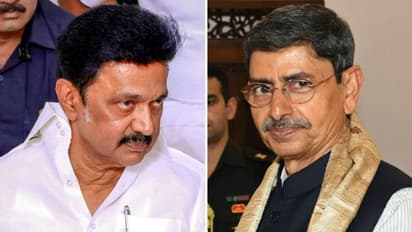Senthil Balaji's sacking: 'Pleasure of the Governor' triggers debate; HC observations throw light on powers

Synopsis
The removal of Senthil Balaji from the council of ministers by Tamil Nadu Governor RN Ravi has triggered a debate on the Governor's authority. According to DMK sources, Chief Minister MK Stalin will disregard the order of the Governor.
Tamil Nadu Governor RN Ravi's decision to remove Senthil Balaji from the council of ministers has sparked debate over whether he really had the power to do so. According to DMK sources, Chief Minister MK Stalin will disregard the order of the Governor. Many have been citing Article 164 (1) of the Indian Constitution which states that the 'ministers shall hold office during the pleasure of the Governor'.
If one were to reflect upon the hearing in the Madras High Court on Tuesday, June 26, relating to pleas challenging the continuation of Senthil Balaji as a minister without portfolio, perhaps, clarity emerges on whether the Governor can dismiss a minister.
In a hearing on Tuesday at the Madras High Court, the issue of the Governor's authority to remove a minister was raised, shedding light on the matter and seeking clarity on the interpretation of Article 164.
The Petitioners' Argument: The petitioners argued that the Governor had previously disagreed with the government's request to retain Senthil Balaji as a minister without portfolio. Referring to Article 164, they contended that a minister serves at the pleasure of the Governor. However, in this case, they claimed that the government went against the Governor's will.
Court's Response: Chief Justice SV Gangapurwala and Justice PD Audikesavalu questioned the petitioners' stance, highlighting that the Governor had not officially set aside the appointment of Senthil Balaji as a minister. The Chief Justice emphasized that the Governor's disagreement did not equate to a positive act of dismissal. "Where has the governor set aside the appointment of that person as a minister? You are relying on 164. He was appointed as minister by the Governor. So that aspect is satisfying. Where do we get the powers of the governor to remove a minister," asked Chief Justice SV Gangapurwala.
The court also sought from the petitioners, official documents that proved that Chief Minister MK Stalin had written to Governor Ravi, asking that Balaji be allowed to continue as minister despite being arrested on June 14 by the Enforcement Directorate in a money laundering case.
Interpretation of the Law: The Chief Justice further referred to the Representation of Peoples Act, emphasizing that a person is not disqualified from holding the position of a minister based solely on pending criminal prosecution. Disqualification occurs only upon conviction.
Need for Clarity: The court stressed the importance of a specific order from the Governor to discharge someone from their ministerial position. They highlighted that interpretation should be based on the law itself, not on assumptions made regarding the Governor's actions. The Chief Minister had requested the Governor to allow Senthil Balaji to continue as a minister without portfolio, without explicitly seeking his removal.
Supreme Court lawyer Sanjay Hegde took to Twitter, to say: "Presidents and Governors in a Parliamentary system reign and do not rule. A Governor or a President cannot act without the aid and advice of the cabinet. There are very few exceptions, set out in the 7 Judge SC judgment in Shamsher Singh's case. Governor wholly wrong in Senthil Balaji dismissal."
Clearly, a deeper legal understanding of Article 164 and its implications is crucial in resolving this controversy.
Tamil Nadu Governor RN Ravi sacks jailed DMK minister Senthil Balaji
Stay updated with the Breaking News Today and Latest News from across India and around the world. Get real-time updates, in-depth analysis, and comprehensive coverage of India News, World News, Indian Defence News, Kerala News, and Karnataka News. From politics to current affairs, follow every major story as it unfolds. Get real-time updates from IMD on major cities weather forecasts, including Rain alerts, Cyclone warnings, and temperature trends. Download the Asianet News Official App from the Android Play Store and iPhone App Store for accurate and timely news updates anytime, anywhere.